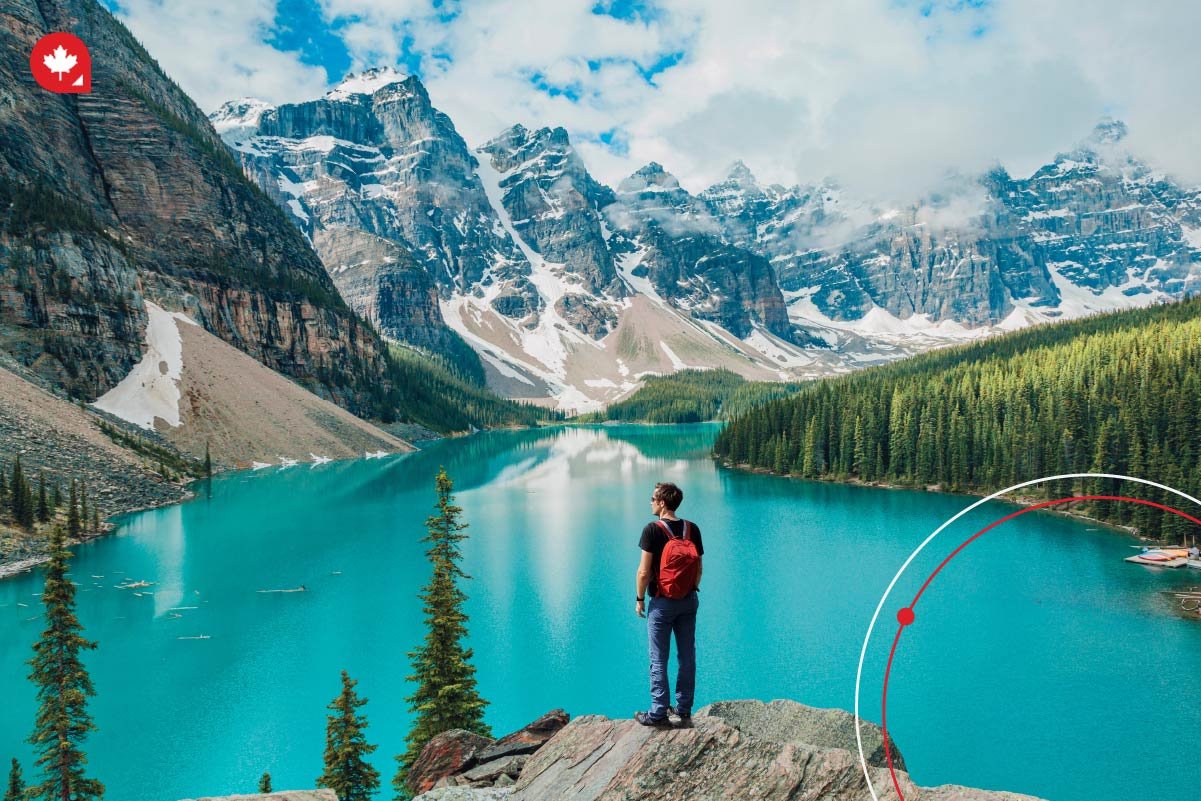New to Canada? Welcome to this beautiful land of maple leaves! We're positive you'll get settled quickly and make new friends who will get you feeling right at home. While it's natural to first experience culture shock, you'll soon fall in love with the ethnically diverse and beautiful country with impressive geographic features, including vast mountain ranges and more than two million lakes.
To help you adjust to your new life in Canada, we've created a quick and easy Canada Newcomers Resource Guide, complete with all the important details you need to know. From public transit to public holidays - we've got you covered!
Settle in Canada as a Newcomer

Settling in a new country can be exciting and challenging. As a newcomer to Canada, you must familiarize yourself with various aspects of life to ensure a smooth transition and integration into Canadian society. From understanding your immigration status to adapting to local customs, these steps will help you settle confidently and thrive in your new home.
Understanding Your Immigration Status
Familiarize yourself with your immigration status and its rights and responsibilities. This includes knowing your work eligibility, healthcare access, and government program eligibility.
- Work Eligibility: Determine if you are eligible to work in Canada and obtain the necessary work permits.
- Healthcare Access: Understand your healthcare coverage and how to access medical services.
- Government Programs: Learn about the government programs and benefits you may be eligible for, such as social assistance, education, and housing.
- Immigration Documentation: Keep your immigration documents organized and easily accessible.
Learning English or French
While Canada is bilingual, learning English or French will significantly enhance your integration and job prospects. Consider taking language courses, joining language exchange programs, or practicing with native speakers.
- Language Courses: Enroll in language courses offered by local community centers, language schools, or online platforms.
- Language Exchange Programs: Connect with native speakers to practice your language skills and learn about Canadian culture.
- Language Immersion: Immerse yourself in the language by watching movies, listening to music, and reading books in English or French.
Finding Housing
Research different housing options, such as renting an apartment, condo, or house, based on your budget and preferences. Consider factors like location, amenities, and transportation options.
- Housing Budget: Determine your housing budget and research rental prices in different neighborhoods.
- Location: Consider factors like proximity to work, schools, and public transportation.
- Amenities: Decide on the amenities that are important to you, such as a gym, pool, or laundry facilities.
- Housing Search: Use online resources, real estate agents, or local newspapers to find suitable housing options.
Opening a Bank Account
Choose a bank that offers services tailored to newcomers and open a bank account to manage your finances. Look for banks with multilingual staff who can assist with financial planning.
- Bank Selection: Research different banks and compare their fees, services, and customer reviews.
- Financial Planning: Consult with a financial advisor or bank representative to discuss your financial goals and create a budget.
- Banking Services: Familiarize yourself with the different banking services available, such as checking accounts, savings accounts, credit cards, and loans.
Getting a Social Insurance Number (SIN)
A SIN is essential for working, collecting social benefits, and accessing government services. Apply for a SIN as soon as possible after arriving in Canada.
- SIN application: Visit a Service Canada office to apply for a SIN. Required documents: Bring the necessary documentation, such as your passport and immigration documents.
- SIN Use: Understand how to use your SIN for various purposes, such as employment and tax filing.
Obtaining a Health Card
Ensure you have health insurance coverage to access healthcare services. Provincial and territorial governments provide health insurance coverage to residents.
- Health Card Eligibility: Determine if you are eligible for a provincial or territorial health card.
- Application Process: Follow the specific application process for your province or territory.
- Healthcare Coverage: Understand the scope of your healthcare coverage and how to access medical services.
Learning About Canadian Culture and Customs
Understanding Canadian culture and customs will help you adapt to new surroundings and build relationships. Learn about Canadian holidays, Etiquette, and social norms.
- Canadian Holidays: Learn about the significance of Canadian holidays and how they are celebrated.
- Canadian Etiquette: Familiarize yourself with Canadian Etiquette and social norms, such as greeting customs, dining etiquette, and conversation topics.
- Cultural Events: Attend cultural events and festivals to experience Canadian culture firsthand.
By following these tips and seeking assistance from local resources, you can successfully navigate your new life in Canada and build a fulfilling future.
Provincial Newcomers Resources Guides
Traveling from one province to another can feel like entering a new country. That's how unique each Canadian province is, and rules and regulations differ greatly from one to the other. For example, the Ontario Health Insurance Plan may cover you differently than the Alberta Health Insurance Plan. For this reason, we compiled a list of Provincial Newcomers Resource Guides to help you find tailored information and resources directly from the province you're planning to call home.
You can learn more about each province below and check our Canada's provincial websites for newcomer information.
- Alberta;
- Ontario;
- British Columbia;
- Saskatchewan;
- Manitoba;
- New Brunswick;
- Nova Scotia;
- Prince Edward Island;
- Newfoundland and Labrador;
- Yukon
- Quebec
Emergency and Helpline Numbers
As a newcomer to Canada, it's crucial to know the national number for police, fire or medical emergencies which is 9-1-1, just like in the United States. The number is toll free and operators will be able to assist you in your own language. Toronto's residents and visitors have access to 9‑1‑1 services in up to 240 languages. For other kinds of emergencies or distressing situations, you can call the following helpline numbers.
| Number | Details |
| 9-1-1 | For fire, police or medical emergencies. The services are available in multiple languages. |
| 1-833-456-4566 | Canada Suicide Prevention Service |
| 1-800-565-8603 | Drug and Alcohol Helpline (Ontario) |
| 888 426-4435 | Animal Poison Control |
| 1 (866) 863 0511 | Assaulted Women’s Helpline (Toronto) |
| 1 (866) 633-4220 | National Eating Disorders Information Centre |
Public Transportation in Canada

As a newcomer in Canada, you may not have your own mode of transportation just yet and will have to rely on public transport. The good news is that the country has a well-developed public transportation system, including buses, trains, and subways. The specific options available will depend on the city you're living in.
Here are some resources to help you navigate public transportation:
- Google Maps: Use Google Maps to plan your routes and find real-time updates on public transportation schedules.
- Transit Apps: Many cities have their own transit apps that provide detailed information on bus and train schedules, fares, and route maps.
What You Can Expect to Pay For Public Transport in Canada
| Type of Transport | Average Cost |
| Bus - Monthly Pass | 165 CAD (adult) |
| Subway - Weekly Pass | 43 CAD |
| Lyft/Uber | 8 CAD per km |
| Gas | 1.197 CAD per litre |
| Ferry | 17 CAD per person (one-way) |
In 2024, public transport costs in Canada vary significantly across different cities and transit systems. Below is a rough estimate of what you may pay for public transport in Canada.
Canadian Public Holidays
It's always good to keep tabs on upcoming public holidays so that you can plan for a weekend getaway or fun outings with friends. Canada has its fair share of public holidays, but we can't give you a precise amount because each province and territory differs. For example, Boxing Day, the day after Christmas, is a public holiday in most provinces except Newfoundland, Northwest Territories, Nunavut, and Ontario. And some provinces have specific local holidays like Nova Scotia Heritage Day on the 15th of February. Religious holidays such as Ramadan, Shavuot, and Diwali are observed across Canada.
| Date | Holiday |
| 1 January | New Years Day |
| 15 February | Family Day (Only AB, BC, NB, ON, SK) |
| 2 April | Good Friday |
| 5 April | Easter Monday (Only NT, NU, QC) |
| 24 May | Victoria Day (All except NB, NS, PE, QC) |
| 1 July | Canada Day |
| 6 September | Labor Day |
| 11 October | Thanksgiving Day (All except NB, NS, PE) |
| 11 November | Remembrance Day (All except MB, NS, ON, QC) |
| 25 December | Christmas Day |
| 26 December | Boxing Day (All except NL, NT, NU, ON) |
Expat Groups

Expat groups are a great way to meet like-minded individuals. Meeting with other expats in Canada will make your integration into the country easier by helping you build a new support network. You can even join an expat group before moving to Canada to ask for helpful advice from people who have been in your shoes before.
Expat Groups in Canada include:
- InterNations
- MeetUp
- Canadian-Asian Associations
- India-Canada Associations
Must-see Places in Canada
If you're a newcomer to Canada, don't just sit at home! get out and explore! It's important to connect with their new surroundings, which can have a particularly beneficial effect on their transition. Heading to museums, local markets, and national parks can help you gain a greater understanding of the local history and feel a greater sense of connection. Not sure where the places of interest are in your area? Simply check travel sites for things to do in your area, like if you live in Toronto. Or start your ultimate bucket list of places to see with the help of our Newcomers to Canada Exploration Guide below.
FAQS
What is the Best Time of Year to Move to Canada?
While there's no definitive "best" time, many people find the spring and summer months to be more pleasant due to the warmer weather. However, each season offers unique experiences and considerations.
What Are the Most Popular Cities for Newcomers to Canada?
Toronto, Vancouver, Montreal, and Calgary are among the most popular choices due to their size, economic opportunities, and cultural diversity. However, smaller cities like Ottawa, Edmonton, and Winnipeg also offer a high quality of life.
What is the Cost of Living in Canada?
The cost of living varies significantly across different regions of Canada. Larger cities like Toronto and Vancouver tend to be more expensive, while smaller cities offer more affordable options. Learn more about the cost of living in Canada.



